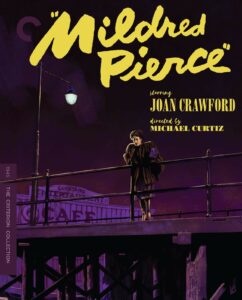Mildred Pierce, released in 1945, is a thought-provoking film noir directed by Michael Curtiz. Based on the novel by James M. Cain, this drama tells the story of Mildred (played impeccably by Joan Crawford), a middle-class housewife who enters the workforce after divorcing her unfaithful husband. Struggling to provide for her two daughters during the Great Depression, Mildred encounters deceit and class tensions as she works to open her own successful restaurant business.

The film stands as a fascinating example of Hollywood noir, exploring themes of sacrifice, social climbing, and the complexities of mother-daughter relationships. Beyond its compelling narrative, the film’s masterful use of cinematography and exceptional performances elevate it to a timeless classic with enduring cultural relevance.
Curtiz utilizes sharp black-and-white cinematography and clever camera angles to develop the film’s bleak mood and underscore turning points in the plot. Scenes are often enveloped in shadow, the bars of a staircase evoking the feeling that characters are trapped by their circumstances. The contrast between light and darkness visually reinforces the class divide between Mildred and the wealthy characters she encounters, as well as the moral descent of her manipulative daughter Veda (Ann Blyth). Close-up reaction shots document the emotional arcs of Mildred, Veda, and her lover Monty (Zachary Scott), allowing the audience to clearly read shifts in their turbulent relationships.
Crawford’s fierce performance depicts Mildred with nuance and sympathy, portraying her empowerment as a working woman while conveying the toll Veda’s entitlement and scorn takes on her psyche. Her transformation from a devoted housewife to a hardened restauranteur is etched with nuance and raw emotion. In the early scenes, her soft features and gentle demeanor embody domesticity. As she navigates the male-dominated world of business, her gaze hardens, reflecting the toll her sacrifices have taken. The iconic “wire hanger” scene, though melodramatic, exemplifies her desperate struggle to maintain appearances for Veda’s approval.
Blyth is brilliantly nasty in her breakout role as the petulant Veda, her mocking musical performances slicing into Mildred’s insecurities about class and success. Her icy beauty and calculated demeanor mask a deep-seated insecurity and manipulative nature. Her contemptuous treatment of Mildred is both infuriating and heartbreaking, underscoring the film’s exploration of dysfunctional family dynamics. Scott infuses the charming but conniving Monty with a sinister energy that keeps viewers questioning his motives. The talented cast elevates Cain’s pulpy source material into a truly artful exploration of the dark side of the American dream.
Upon release, Mildred Pierce garnered critical praise and several Academy Award nominations. It won an Academy Award for Crawford’s brave performance, cementing her comeback and the film’s place as a classic melodrama. Its themes surrounding gender roles, social mobility, class, and strained parent-child relationships continue to profoundly resonate with modern audiences. 75 years later, Mildred Pierce remains a stylistic triumph and an incisively bleak portrait of ambition and sacrifice
